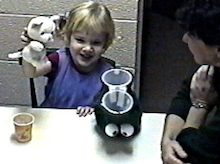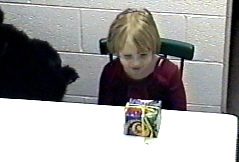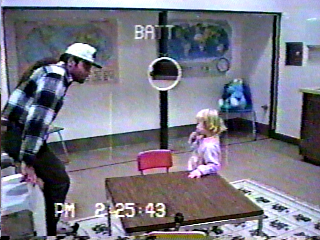Research
As a developmental psychologist, I am fascinated by how individuals change over time and how our environment helps shape who we are. While I have taught classes in many areas, the majority of my research has focused on media, morningness-eveningness, and how preschoolers cope with everyday challenges both physiologically and behaviorally. With my newest projects, I am extending this focus to include research on STEAM and play.
Media
Preschoolers’ Perceptions of Gendered Toy Commercials
In a recent study, I interviewed 3- to 6-year-old children about toy commercials targeted to girls and boys. On the plus side, most children were flexible in terms of who they felt the toy commercials were meant for and many answered “both” when asked about ads for traditionally stereotyped toys. A majority also liked at least one of the cross-gender ads. Unfortunately, this flexibility was limited.

Traditional stereotypes are still powerful. Both boys and girls showed less positive emotion when viewing ads targeted to the other gender. And when asked to choose a favorite, most went with a toy stereotypically associated with their gender. Responses from boys became even more stereotyped with age, presumably as a result of accumulating societal pressure to avoid “gender-inappropriate” activities.
Experience makes a difference. One reason the children gave for why a given commercial was for both boys and girls was they had shared the stereotypical toy with friends or siblings of the other gender. Other research has shown that media messages can shift children’s views in a nonstereotypical direction as well. But for that to work, the messages have to change.
Raising Virtual Children
Several years ago, I examined the use of a virtual simulation program, My Virtual Child, that allows students to raise their own virtual child using concepts and theories related to child development. This hands-on virtual parenting experience engaged my students and helped them connect class material to the real world. The simulation is now a central part of my child development classes.

Preschool Television
Many years ago, I worked on a report for Children’s Television Workshop (now Sesame Workshop) piloting shows for the Big Bag television series. We interviewed preschool children in small groups and asked them what they liked, remembered, and understood. We also looked at what they did while they watched. Some talked to the screen, pointed, smiled, laughed, others looked away—the children had many ways of letting us know what they thought about different shows.

Morningness-Eveningness
Owls, Larks, and Hummingbirds
Owls prefer evening hours, larks favor mornings, and hummingbirds fall somewhere in between. Which one are you?

Young Owls and Larks
While we know quite a bit about owls and larks in adolescence and adulthood, little research has looked at young children. In a study I conducted a few years ago, mothers of toddlers and preschoolers helped me learn more.
Not surprisingly, in both morning and bedtime routines mothers of evening types (owls) were more likely to report challenges. For while young morning types (larks) tended to fall asleep easily and wake themselves up in the morning, evening types were more likely to show bedtime resistance, wake in a negative mood, and have conflicts with their parents.
On days the child had to be somewhere by 7:00 am, mothers of morning type children often stuck to their normal routine, while mothers of evening type children employed different strategies to get their children up and out the door. These strategies included having their child go to bed earlier the night before, getting up early to begin the process of waking their child, letting their child sleep as long as possible, and/or waiting until everything was ready to get their groggy child up, dressed, and in the car.

How Children Cope with Everyday Challenges
What’s going on in there?
It’s easy to see how children react to things behaviorally. You just have to look. But how do they respond on the inside? One way to look at this is to collect saliva. Many different hormones can be assayed in saliva, including the stress hormone cortisol. To make the collection process more fun, I designed the Feed the Frog game. In Feed the Frog children take a small amount of sugar to stimulate saliva flow and then spit the “magic food” into a “frog” whose belly contains a cryogenic vial to collect the sample.

Waiting is hard
Preschoolers can always be counted on to come up with creative ways to help them wait for things they want. From singing an “I like candy” song to attempts at negotiation (e.g., “if I wait can I have both presents?”), children in my candy and present studies devised different ways to help them wait 10 minutes for a prize. Of course, for some it was harder than others. In the present game, 41% showed a physiological stress response (cortisol was not measured for the candy game). So physiologically, many of the children appeared to be unsure about whether or not they would be able to wait the full ten minutes, even though the vast majority did.

Temperament influences how preschoolers interpret and react to things
Facing new people, places, and situations can be especially hard when you’re shy. So, as you would expect, bold children were more likely to talk to an unknown male college student. Their shy peers were more likely to stare at the floor. But what did the children look like physiologically? Not surprisingly, 53% of the shy children showed a stress response. But 31% of the bold children did as well. Why would bold children show a stress response in this situation? I believe their stress was related to their attempts to become acquainted with the stranger—it’s not always easy to put yourself out there, you never know for sure if you’ll be successful or not.

Good strategies help
Across my studies, I have found that having good emotion regulation strategies can help prevent a physiological stress response. The more children use strategies that involve actively changing the situation or their view of it, the better they fare in the face of daily challenges.
Publications
Zimmermann, L. K. (2017). Preschoolers’ perceptions of gendered toy commercials in the US. Journal of Children and Media, 11(2), 119-131.
Zimmermann, L. K. (2016). The influence of chronotype on the daily lives of young children. Chronobiology International, 33(3), 268-279.
Schulke, B. B., & Zimmermann, L. K. (2014). Morningness-eveningness and college advising: A road to student success? Mind, Brain, and Education, 8(4), 227-230.
Zimmermann, L. K. (2013). Using a virtual simulation program to teach child development. College Teaching, 61(4), 138-142.
Zimmermann, L. K. (2011). Chronotype and the transition to college life. Chronobiology International, 28(10), 904-110.
Zimmermann, L. K. (2008). A salivary collection method for young children. Psychophysiology, 45(3), 353-355.
Zimmermann, L. K., & Stansbury, K. (2004). The influence of emotion regulation, level of shyness, and habituation on the neuroendocrine response of three-year-old children. Psychoneuroendocrinology, 29(8), 973-982.
Zimmermann, L. K., & Stansbury, K. (2003). The influence of temperamental reactivity and situational context on the emotion regulatory abilities of three-year-old children. The Journal of Genetic Psychology, 164(4), 389-409.
Stansbury, K., & Zimmermann, L. K. (1999). Relations among child language skills, maternal socializations of emotion-regulation, and child behavior problems. Child Psychiatry and Human Development, 30(2), 121-142.
Cofer, L. F., Grice, J. P., Sethre-Hofstad, L., Radi, C. J., Zimmermann, L. K., Palmer-Seal, D., & Santa-Maria, G. (1999). Developmental perspectives on morningness-eveningness and social interactions. Human Development, 42(4), 169-198.
Zimmermann, L. K. (1996). The development of an environmental values short form. The Journal of Environmental Education, 28(1), 32-37.
Zimmermann, L. K. (1996). Knowledge, affect, and the environment: Fifteen years of research. The Journal of Environmental Education, 27(3), 41-44.
Technical Reports
Zimmermann, L. K. (2013). MyVirtualChild Efficacy Report. Upper Saddle River, NJ: Pearson.
Jacobvitz, R. S., Stansbury, K., Zimmermann, L. K., Sethre-Hofstad, L., & Chambers, L. (1995). BIG BAG New Mexico Study Report. New York: Children’s Television Workshop.
Interviews/Media Appearances
Freydkin, D. (2021, January 21). The most thoughtful, engaging, feminist picture books for kids: That are actually fun to read. https://www.fatherly.com/play/best-feminist-books-for-kids/
Kent, K. A. (2019, February 26). Gender stereotypes and children’s toys. The Morning Show. Wisconsin Public Radio. https://www.wpr.org/how-children-learn-about-world-through-toys
Klaus, P. (2018, February 5). Breaking gender stereotypes in the toy box. The New York Times. https://www.nytimes.com/2018/02/05/well/family/gender-stereotypes-children-toys.html
Hughes, T. (2017, September 15). Gender stereotypes: The world according to pre-
schoolers. Play Unlimited. http://www.playunlimited.org.au/2017/09/15/gender-stereotypes-world- according-pre-schoolers/
Bush, K. (2013, February 6). Is your preschooler a lark or an owl? Good Morning Winchester. TV3 Winchester.
Walter, K. (2013, February 7). SU professor to research sleeping habits. Northern Virginia Daily.
Presentations
Zimmermann, L. K., Daraiseh, S., Mokhtar, M., Crowley, K., & Kartiwi, M. (2023). COIL in the Classroom. Panel presented at the Barzinji Conference, Winchester, VA.
Zimmermann, L. K. (2023). Scholarship Talk: Being Little in a World of Big Feelings. Shenandoah University.
Zimmermann, L. K. (2020, August 4). Perusall: A grand experiment. Shenandoah University Transformative Teaching and Learning Webinar Event.
Zimmermann, L. K. (2015, June). It started in the classroom: My path to publication in nonfiction children’s magazines. Presented at the Shenandoah University Children’s Literature Conference, Winchester, VA.
Zimmermann, L. K. (2013, October 22). Using MyVirtualChild to teach child development. Presented at MyVirtualChild and Measuring Results [Webinar]. A part of Pearson’s MyVirtualChild webinar series.
Zimmermann, L. K. (2012, May). From virtual children to virtual worlds: Using technology to teach students about the real world. Presented at The Metamorphosis of Higher Ed: Mobile Technologies for Content Delivery to Support New Teaching Paradigms, Winchester, VA.
Zimmermann, L. K., Downey, M. C., & Lapham, H. D. (2007, May). Morningness-eveningness, sleep patterns, and coping with college life. Poster presented at the Association for Psychological Science Convention, Washington, DC.
Discussant for a paper symposium entitled “The Mother-Infant Relationship as a Context for Infant Adrenocortical Function,” March 2007 meeting of the Society for Research in Child Development, Boston, MA.
Zimmermann, L. K., Meder, V., Otto, M. (2006, April). The roles of birth order, siblings, and gender on preschoolers’ toy choice. Paper presented at the Conference on Human Development, Louisville, KY.
Zimmermann, L. K., Otto, M., Meder, V. (2006, April). Feed the Frog: A salivary collection method for preschoolers. Poster presented at the Conference on Human Development, Louisville, KY.
Zimmermann, L. K. (2003, April). Predictors of neuroendocrine response in three-year-old children: Temperamental reactivity, emotion regulation, and habituation. Poster presented at the meeting of the Society for Research in Child Development, Tampa, FL.
Zimmermann, L. K. (1998, March). Emotion regulation and cortisol elevation in shy and bold three-year-old children. Paper presented at the Conference on Human Development, Mobile, AL.
Zimmermann, L. K., Ogle, R. L., & Stansbury, K. (1996, April). The relationship between temperament, language, and emotion-regulation. Poster presented at the International Conference on Infant Studies, Providence, RI.
Stansbury, K., Zimmermann, L. K., Sethre-Hofstad, L., Chambers, L. R., & Sandoval, D. R. (1996, April). Emotion regulation/cortisol interrelationships in infancy. Paper presented at the International Conference on Infant Studies, Providence, RI.
Ogle, R. L., Zimmermann, L. K., Bartel, J., & Stansbury, K. (1996, April). The developmental course of temperament and attachment in predicting marital adjustment. Poster presented at the International Conference on Infant Studies, Providence, RI.
Sethre-Hofstad, L., Zimmermann, L. K., Chambers, L., & Stansbury, K. (1995, April). Contribution of psychoneuroendocrine variables, temperament, quality of attachment, and age to emotion regulation in infants. Poster presented at the meeting of the Society for Research in Child Development, Indianapolis, IN.
Stansbury, K., & Zimmermann, L. K. (1994, June). Attachment, temperament, and emotion- regulation: A longitudinal investigation of developmental mechanisms. Poster presented at the International Conference on Infant Studies, Paris, France.
Cofer, L. F., Grice, J., Palmer, D., Sethre-Hofstad, L., & Zimmermann, K. (1993, May). Parental conflict, maturational change, and morningness-eveningness. Paper presented at the meeting of the Southwestern & Rocky Mountain Division of the American Association for the Advancement of Science, Albuquerque, NM.
Cofer, L. F., Grice, J., Palmer, D., Sethre-Hofstad, L., & Zimmermann, K. (1992, June). Evidence for developmental continuity of individual differences in morningness-eveningness. Poster presented at the meeting of the American Psychological Society, San Diego, CA.
Cofer, L. F., Grice, J., Palmer, D., Sethre-Hofstad, L., & Zimmermann, K. (1992, April). Morningness-eveningness, patterns of sleep, and coping strategies. Paper presented at the meeting of the Southwestern Psychological Association, Austin, TX.
Cofer, L. F., Grice, J., Palmer, D., Sethre-Hofstad, L., Zimmermann, K., Santa Maria, G., Dauphinot, W., Daubek, F., & Edmondson, L. (1992, March). Human circadian rhythms and introversion-extraversion: A southwestern study. Poster presented at the meeting of the Southwestern Society for Research in Human Development, Tempe, AZ.